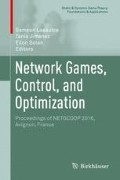Abstract
Despite the lure of a considerable increase in spectrum usage efficiency, the practical implementation of cognitive radio (CR) systems is being obstructed by the need for efficient and reliable protection mechanisms that can safeguard the quality of service (QoS) requirements of licensed users. This need becomes particularly apparent in dynamic wireless networks where channel conditions may vary unpredictably – thus making the task of guaranteeing the primary users (PUs)’ minimum quality of service requirements an even more challenging task. In this paper, we consider a pricing mechanism that penalizes the secondary users (SUs) for the interference they inflict on the network’s PUs and then compensates the PUs accordingly. Drawing on tools from online optimization, we propose an exponential learning power allocation policy that is provably capable of adapting quickly and efficiently to the system’s variability, relying only on strictly causal channel state information (CSI). If the transmission horizon T is known in advance by the SUs, we prove that the proposed algorithm reaches a “no-regret” state within \(\mathcal{O}(T^{-1/2})\) iterations; otherwise, if the horizon is not known in advance, the algorithm still reaches a no-regret state within \(\mathcal{O}(T^{-1/2}\log T)\) iterations. Moreover, our numerical results show that the interference created by the SUs can be mitigated effectively by properly tuning the parameters of the pricing mechanism.
Access this chapter
Tax calculation will be finalised at checkout
Purchases are for personal use only
References
Qualcomm, “The 1000x data challenge,” Technical Report, 2014.
S. Haykin, “Cognitive radio: brain-empowered wireless communications,” vol. 23, no. 2, pp. 201–220, 2005.
J. Huang and L. Gao, “Wireless network pricing,” Synthesis Lectures on Communication Networks, vol. 6, no. 2, pp. 1–176, 2013.
T. Alpcan, T. Başar, R. Srikant, and E. Altman, “Cdma uplink power control as a noncooperative game,” Wireless Networks, vol. 8, no. 6, pp. 659–670, 2002.
C. Saraydar, N. Mandayam, and D. Goodman, “Efficient power control via pricing in wireless data networks,” Communications, IEEE Transactions on, vol. 50, no. 2, pp. 291–303, 2002.
S. D’Oro, P. Mertikopoulos, A. L. Moustakas, and S. Palazzo, “Interference-based pricing for opportunistic multicarrier cognitive radio systems,” vol. 14, no. 12, pp. 6536–6549, 2015.
S. Shalev-Shwartz, “Online learning and online convex optimization,” Foundations and Trends in Machine Learning, vol. 4, no. 2, pp. 107–194, 2011.
P. Mertikopoulos, A. L. Moustakas, et al., “The emergence of rational behavior in the presence of stochastic perturbations,” The Annals of Applied Probability, vol. 20, no. 4, pp. 1359–1388, 2010.
N. Cesa-Bianchi and G. Lugosi, Prediction, Learning, and Games. Cambridge University Press, 2006.
G. F. Pedersen, COST 231-Digital mobile radio towards future generation systems. EU, 1999.
G. Calcev, D. Chizhik, B. Göransson, S. Howard, H. Huang, A. Kogiantis, A. F. Molisch, A. L. Moustakas, D. Reed, and H. Xu, “A wideband spatial channel model for system-wide simulations,” Vehicular Technology, IEEE Transactions on, vol. 56, no. 2, pp. 389–403, 2007.
Acknowledgements
This research was supported in part by the Orange Lab Research Chair on IoT within the University of Cergy-Pontoise, the CNRS project REAL.NET–PEPS–JCJC–2016, by ENSEA, Cergy-Pontoise, France. Also, this research has received financial support from the French National Research Agency (ANR) under grant ORACLESS-ANR-16-CE33-0004-01. PM was partially supported by the French National Research Agency under grant no. ANR–13–INFR–004-NETLEARN.
Author information
Authors and Affiliations
Corresponding author
Editor information
Editors and Affiliations
Rights and permissions
Copyright information
© 2017 Springer International Publishing AG
About this paper
Cite this paper
Marcastel, A., Belmega, E.V., Mertikopoulos, P., Fijalkow, I. (2017). Interference Mitigation via Pricing in Time-Varying Cognitive Radio Systems. In: Lasaulce, S., Jimenez, T., Solan, E. (eds) Network Games, Control, and Optimization. NETGCOOP 2016. Static & Dynamic Game Theory: Foundations & Applications. Birkhäuser, Cham. https://doi.org/10.1007/978-3-319-51034-7_17
Download citation
DOI: https://doi.org/10.1007/978-3-319-51034-7_17
Published:
Publisher Name: Birkhäuser, Cham
Print ISBN: 978-3-319-51033-0
Online ISBN: 978-3-319-51034-7
eBook Packages: Mathematics and StatisticsMathematics and Statistics (R0)

